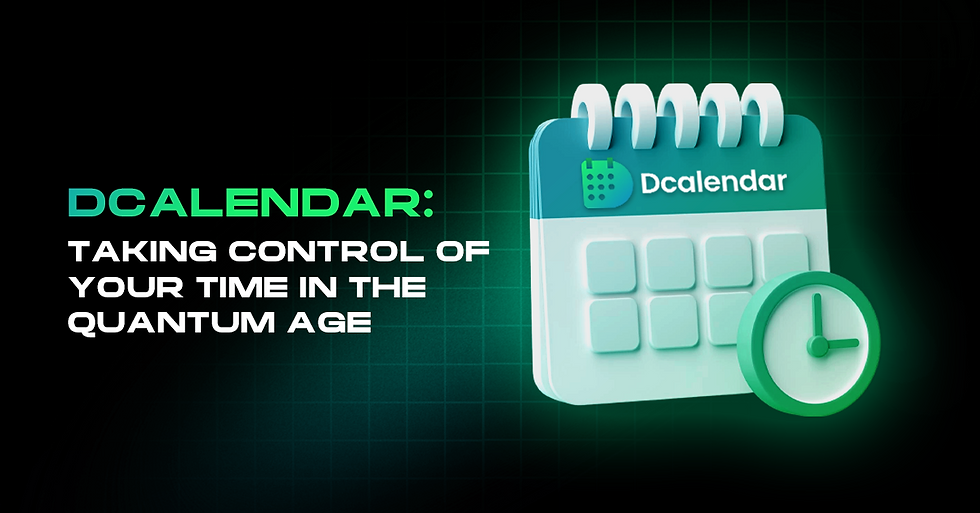DCalendar: Taking Control of Your Time in the Quantum Age
- Nitin Kumar
- Aug 27, 2025
- 3 min read

Early in the age of disruption — whether of quantum technologies or widespread digital surveillance — even how we deal with time is being disrupted. DCalendar is a decentralized calendar that runs on NCOG blockchain—a quantum-resistant technology.
DCalendar brings us freedom, privacy, and efficiency to our most valuable resource—TIME. Welcome to a universe in which your time, your calendar, is not just arranged, but owned.
The Era of Quantum does Time Management
The “quantum age” is not something that’s just coming—it’s already here. It’s already remaking logistics, health care, cybersecurity and even some everyday routines. You probably won’t be using quantum devices to make phone calls any time soon. But, in the backend, quantum innovations are in the process of disrupting architectures of trust and security.
The incorporation of new quantum-safe encryption into scheduling systems, such as DCalendar, is a logical continuation of this trend. Not quantum computers in your pocket, mind you — rather, implementing quantum‑resistant technologies today to protect tomorrow’s digital infrastructure.
By using cryptographical primitives that are resistant to quantum attacks (commonly referred to as Post‑Quantum Security), DCalendar guarantees the privacy of notifications, event invitations, and of the scheduling metadata (i.e., the sharing of an agenda) even w.r.t. future quantum adversaries.
What Is DCalendar?
DCalendar is a decentralized scheduling tool created by NCOG, and is part of its larger D‑Suite suite, which includes D‑Mail, D‑Contacts, and D‑Tags. Unlike centralized servers that are owned by a commercial product company, DCalendar is based on a distributed or peer‑to‑peer network; hence users have full control over the calendar data.

Key capabilities of Dcalendar:
Smart Booking & Shared Availability: Public booking links refresh automatically to show availability in real-time. Groups can share group slots, and have conflict detection and smart auto‑rescheduling across Synced Calendars.
Non-Reversible Event Logs: Once an event is stored, there is no way of reversing or deleting data from the blockchain – it’s written in stone and easily verifiable by all parties involved.
Quantum‑Secure Invites & Encryption: Safely swap invites and all necessary event details through post‑quantum encryption for guaranteed confidentiality.
Full Integration with D‑Suite: Integrates directly with decentralized email, contact, and identity—self‑sovereign in a single, unified environment.
These are all qualities that stand in stark contrast to a centralized calendar system, such as Google Calendar or Outlook, in which the hosting provider can modify, remove, or spy on the events within.
Why You Should Use DCalendar in the Time Economy of Today
Privacy & Ownership:
First, centralized calendars involve invasive tracking, profiling, and advertising dangers. They store vast reserves of personal information — where and when meetings will happen, what will be discussed, who will be attending — on corporate servers. These may be shared, leaked, or accessed without proper authorization.
By contrast, with DCalendar:
Users control their data entirely.
No one company can manipulate or sell your schedule.
They are explicitly given and can be revoked to your calendar.
You get to choose who sees your availability, and no third‑party operators get your email address.
Immutability & Trust
In the complex structures of universities, healthcare or government bodies, meeting overlaps, overwriting events, errors, and disputes are more likely to emerge. Dcalendar’s unchangeable record keeps all records unaltered so they can be seen and verified by all parties, eliminating disputes and boosting transparency.
Interoperability & Fluid Collaboration
DCalendar: Open Protocol, Peer‑to‑Peer DCalendar uses open protocols and peer‑to‑peer channels that enable it to work across devices, organisations, and apps—no lock‑in. All attendees on different networks can still see, facts‑check, and interact with the same schedule, live.
Scalability Challenges & Solutions
Blockchain calendars have a variety of problems to solve: how to propagate event updates to hundreds of nodes, low-latency issues, identity and authentication at scale, data storage efficiency, and scaling with a large number of concurrent users.
DCalendar Responders to this need include techniques such as sharding to distribute the load of the ledger, efficient peer‐to‐peer synchronization protocols and decentralized identity systems (DIDs) for authentication without any centralized servers.
These architectural features enable the DCalendar to scale with the organizations and the users, without sacrificing performance or security.
Manage Your Time: Productivity in the Quantum Age
Next-generation tools, from A.I. to quantum computing, could turbocharge productivity — yet untrammeled time (as in free, unrestricted by any prior commitments) continues to be the all-important bottleneck. Typical calendaring solutions can lead to back-to-back meetings, divided attention, and suboptimal focus time.
And DCalendar doesn’t just give users that control over their schedule, “it also provides the tools to keep and optimize your time:
Public booking links with live availability to remove friction on unnecessary negotiation and scheduling.
Automatic conflict detection and intelligent rescheduling, deepening the sense of the blocks being meaningful, intentional decisions.
Decentralized messaging and identity integration, allowing the user to schedule availability without leaking private metadata.
In a time when the demands on our attention and privacy are monumental, DCalendar...




Comments